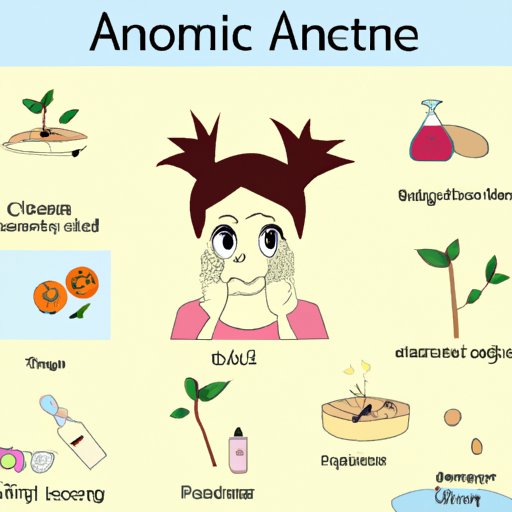Introduction
Acne is a common skin condition that affects people of all ages. It is caused by a combination of factors, including hormones, genetics, stress, and diet. While there is no cure for acne, there are several treatments available to help manage it. In this article, we’ll explore the different types of acne, the link between diet and acne, and treatments and natural remedies for acne.

Prevention and Treatment of Acne Breakouts
The best way to prevent acne breakouts is to practice basic skincare practices. This includes washing your face twice a day with a mild cleanser, using an oil-free moisturizer, and avoiding picking or squeezing pimples. Additionally, using non-comedogenic makeup can help reduce the risk of clogged pores.
If basic skincare practices don’t help, medical treatments may be necessary. These include antibiotics, topical creams, and retinoids. Antibiotics are used to reduce inflammation and kill bacteria on the skin, while topical creams and retinoids help unclog pores and reduce oil production. Your doctor may also recommend oral medications, such as birth control pills or isotretinoin, to treat severe cases of acne.
Exploring the Causes of Acne
Acne can be caused by a variety of factors, including genetics, hormones, stress, and diet. Genetics play a role in how your body responds to certain hormones, which can lead to an increase in sebum production and clogged pores. Hormones, such as testosterone and estrogen, can also trigger acne breakouts. Stress can cause an increase in the hormone cortisol, leading to increased sebum production and inflammation. Lastly, diet has been linked to acne, as certain foods can increase inflammation and trigger breakouts.

Different Types of Acne and Their Treatments
There are several different types of acne, each with its own set of treatments. Whiteheads are small bumps filled with pus that form when a pore is blocked and becomes inflamed. Blackheads are similar to whiteheads, but they are open at the surface and appear black in color. Pustules are red, inflamed bumps filled with pus. Cysts are deep, painful bumps that are filled with pus and can cause scarring. Papules are small, red bumps that are tender to the touch. Nodules are large, hard bumps that form deep within the skin and can be painful.
Treatments for each type of acne vary. Whiteheads and blackheads can be treated with topical creams and retinoids, while pustules, cysts, and nodules may require oral medications. Papules can be treated with topical creams, gentle exfoliation, and warm compresses. Additionally, using products containing salicylic acid or benzoyl peroxide can help reduce inflammation and kill bacteria on the skin.
Natural Remedies for Acne
In addition to traditional treatments, there are several natural remedies for acne that can be used. Tea tree oil is a natural antiseptic that can help reduce inflammation and kill bacteria. Apple cider vinegar helps balance the pH level of the skin and can reduce redness and inflammation. Honey is a natural antibacterial and can help soothe the skin. Baking soda is an effective exfoliant that can remove dead skin cells and unclog pores.

Understanding the Link Between Diet and Acne
Diet can play an important role in preventing and treating acne. Certain foods, such as processed foods, sugar, dairy, and fried foods, can increase inflammation and trigger breakouts. Additionally, some studies suggest that consuming too much iodine can aggravate acne. To minimize the risk of breakouts, it’s important to eat a balanced diet that includes plenty of fruits and vegetables, whole grains, and lean proteins.
Additionally, it’s important to drink plenty of water, as dehydration can make acne worse. Staying hydrated helps flush out toxins from the body and keep the skin healthy. Lastly, avoiding smoking and excessive alcohol consumption can help reduce the risk of breakouts.
Conclusion
Acne is a common skin condition that can affect people of all ages. While there is no cure for acne, there are several treatments and natural remedies that can help manage it. Prevention is key, so it’s important to practice basic skincare practices and avoid certain foods that can trigger breakouts. Additionally, understanding the different types of acne and their treatments can help you find the best treatment plan for you. With the right treatment plan, you can reduce the severity of your acne and help clear up your skin.


